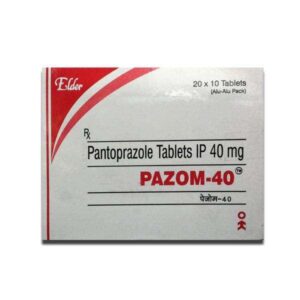PANTOPRAZOLE + DOMPERIDO
Pantoprazole: Pantoprazole is a drug that belongs to the class of proton pump inhibitors (PPIs). It is commonly used for the treatment of conditions such as gastroesophageal reflux disease (GERD), peptic ulcers, and Zollinger-Ellison syndrome. It works by reducing the production of stomach acid, thus relieving symptoms such as heartburn, acid regurgitation, and indigestion.
The usual dose of pantoprazole for adults is 40 mg orally once daily before a meal. The duration of treatment depends on the condition being treated and can vary from a few weeks to several months.
Common side effects of pantoprazole include headache, diarrhea, nausea, stomach pain, gas, and dizziness. These side effects are usually mild and go away on their own. However, if any of these side effects persist or worsen, it is important to consult a healthcare professional.
In rare cases, pantoprazole may cause more serious side effects such as severe allergic reactions, including difficulty breathing, swelling of the face, lips, or tongue, severe stomach pain, bone fractures, and low magnesium levels. It is important to seek medical attention immediately if any of these severe side effects occur.
Pantoprazole should be used with caution in individuals who have liver disease, are taking certain medications (such as warfarin), or have a history of low magnesium levels. It is also not recommended for use during pregnancy or breastfeeding unless specifically prescribed by a healthcare professional.
As with any medication, it is important to follow the prescribed dosage and consult with a healthcare professional before starting or stopping the use of pantoprazole.
Domperido: Domperidone is a medication used to treat gastrointestinal symptoms such as nausea, vomiting, and heartburn. It is also prescribed to increase milk production in breastfeeding women.
The mechanism of action of Domperidone involves blocking dopamine receptors in the brain and gut. By doing so, it increases the movement of food through the stomach and intestines, which helps to relieve symptoms such as nausea and vomiting.
The usual dose of Domperidone for adults is 10-20 mg taken three to four times a day, 15-30 minutes before meals and at bedtime. For the treatment of breastfeeding difficulties, the dose is typically 10-20 mg three to four times a day, before meals and at bedtime.
Some common side effects of Domperidone include headache, dizziness, dry mouth, and stomach cramps. In rare cases, it may cause serious side effects such as irregular heartbeat, high blood pressure, or a serious allergic reaction. If any severe side effects occur, it is important to seek immediate medical attention.
It is worth noting that Domperidone has been associated with an increased risk of a potentially serious heart condition called QT prolongation. Therefore, it is essential to follow the prescribed dose and consult a healthcare professional if any heart-related symptoms occur during treatment. Additionally, Domperidone should be used with caution in patients with liver or kidney problems, as it may have an impact on their function.
Overall, while Domperidone can be an effective treatment for gastrointestinal symptoms and increasing milk production in breastfeeding women, it is important to use it under the guidance of a healthcare professional and be aware of potential side effects.


